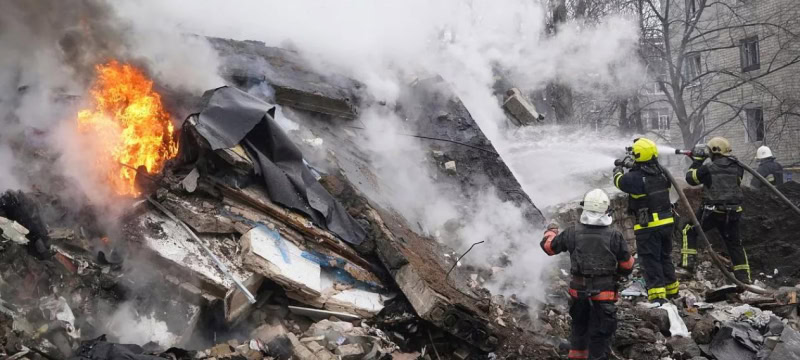Early on Monday, Russia launched missile strikes on Kyiv, Ukraine’s capital, causing fires, damaging homes and infrastructure, and injuring at least two people due to falling debris from intercepted missiles, officials reported.
Ukraine’s air defense managed to shoot down over 10 cruise missiles and nearly 10 ballistic missiles, according to the city’s military administration on Telegram. Air raid alerts were issued across Ukraine for nearly two hours until the air force declared the skies clear at 0330 GMT. Poland, a neighboring NATO member, deployed its aircraft to secure its airspace during the attacks.
Read more: Russian Spy Whale Found Dead in Norway, Mystery Deepens
In Kyiv, a boiler house at a water plant and the entrance to a metro station serving as a bomb shelter in the Svyatoshynksyi district sustained damage, though the station remains operational. Fires broke out in various parts of the city, including cars and a non-residential building in Shevchenkivskyi. Emergency services attended to incidents in Svyatoshynksyi, Holosiivskyi, and Solomyanskyi districts, with debris affecting areas including a major train station and the main airport.
This attack follows a previous massive assault by Moscow a week ago, involving over 200 missiles and drones, which Kyiv described as the war’s “most massive” attack. Russia denies targeting civilians in the ongoing conflict.
Russian missiles strike Ukraine’s Kharkiv
On Sunday, at least 47 people, including five children, were injured when Russian missiles struck a shopping mall and event complex in Kharkiv, Ukraine’s northeastern city, officials reported.
Earlier, Russia claimed that Kyiv launched one of its largest drone attacks since the war began, targeting power plants and an oil refinery, while Russian forces advanced towards a key town in eastern Ukraine. The Kharkiv strike led Ukrainian President Volodymyr Zelensky to urge allies to provide Kyiv with Western-supplied missiles capable of reaching deeper into Russian territory to mitigate the threat posed by Russia.
The conflict is at a critical point, with Russia intensifying its offensive in eastern Ukraine and attempting to push back Ukrainian forces that had breached its western border on August 6. Last week, Russia carried out its heaviest airstrikes of the war, hitting various targets including energy facilities. Moscow, which denies targeting civilians, justifies damaging Ukraine’s energy infrastructure as a military necessity. Since the conflict began in February 2022, Russian drone and missile attacks have resulted in numerous civilian casualties.
Ukraine, bolstered by a growing domestic drone industry, has increased its attacks on Russian infrastructure. Kyiv is also seeking permission from the U.S. and other allies to use more powerful Western weapons to strike deeper into Russia and weaken Moscow’s ability to attack Ukraine.
Following the Kharkiv attack, Zelensky called for global support to stop the ongoing terror, emphasizing the need for courage from world leaders to equip Ukraine adequately for self-defense. In Kharkiv, rescue workers and volunteers attended to the injured and transported them to ambulances amidst shattered glass and debris, with some seeking shelter in a metro station.
Earlier, Russian officials reported that their air defense systems had downed 158 Ukrainian drones overnight, with debris causing fires at Moscow Oil Refinery and Konakovo Power Station in the Tver region. Kyiv has not yet responded to the drone attacks, and Russia often underreports the full impact of Ukrainian air strikes.
Russia’s nuclear doctrine
Ukrainian President Volodymyr Zelensky reported that last week alone, Russia launched 160 missiles, 780 guided bombs, and 400 attack drones targeting Ukrainian cities and military positions. He called for long-range strikes on Russian missile launch sites, the destruction of Russian military logistics, and joint efforts to intercept missiles and drones.
Kyiv’s allies are cautious about the potential repercussions if their weapons are used against deep Russian targets, with concerns over how Russian President Vladimir Putin might respond. Russia’s TASS news agency quoted Deputy Foreign Minister Sergei Ryabkov as suggesting that Moscow might revise its nuclear doctrine in reaction to Western actions, though specific changes were not detailed. Currently, Russia’s nuclear policy, established by President Vladimir Putin in 2020, allows for nuclear weapon use if faced with a nuclear attack or a conventional threat that endangers the state’s survival.
Ryabkov indicated that modifications to Russia’s nuclear stance are underway, with some Russian military analysts advocating for a lower threshold for nuclear use to deter Western adversaries.
Advances in eastern Ukraine
In eastern Ukraine, where the heaviest fighting is taking place, Russian forces continued their advance towards Pokrovsk, a crucial military and transport hub. Despite Ukraine’s recent surprise incursion into Russia’s Kursk region, aimed at relieving pressure on eastern forces, it has not yet shifted the situation.
Russia’s defense ministry reported capturing two more settlements in the Donetsk region, including Ptyche, located 21 km southeast of Pokrovsk, and claimed continued advancement into Ukrainian defenses. Russian shelling of Kurakhove, about 35 km south of Pokrovsk, resulted in at least three deaths and nine injuries.
Meanwhile, Ukrainian forces shelled Russia’s southern Belgorod region, injuring 11 people, including two children in serious condition, according to regional governor Vyacheslav Gladkov.









